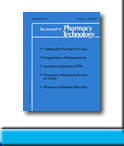 |
 |
Pharmacists’ Perceptions of Barriers to Implementing Medication Therapy Management and the Role of Pharmacy Technicians in Overcoming the Barriers
David R Bright, Aaron J Lengel, and Mary F Powers
To request full article click here.
BACKGROUND: Recent literature supports the value of clinical pharmacy services in the outpatient setting, but pharmacists must overcome barriers to the implementation of clinical services to establish an effective and efficient program.
Objective: To identify pharmacists’ perceptions of barriers to the implementation of medication therapy management (MTM) and perceptions of collaboration with pharmacy technicians.
Methods: Surveys were sent to all 415 community pharmacists in a supermarket pharmacy chain marketing area in Ohio. Pharmacists completed the anonymous survey to indicate their opinions regarding a series of potential barriers to the implementation of MTM, including education and training, current and desired roles of pharmacy technicians, and support from store management.
Results: Of responding pharmacists, 16.2% reported that they had personally participated in an MTM encounter, with an average number of encounters per pharmacist of 1.4. Pharmacists reported a desire for additional training in disease states commonly addressed in MTM, MTM systems, and MTM service elements, but 50.5% felt comfortable as a provider of MTM without additional training. More than 90% of pharmacists reported that sufficient staffing and overlap affords the opportunity for 0–5 MTM encounters per week. Pharmacists reported that few technicians are trained to assist with MTM, but more than 70% of pharmacists would seek technician assistance with scheduling, billing, and patient correspondence.
Conclusions: Although technician assistance may help to reduce pharmacist staffing and training needs, few technicians are trained for clinical support roles. Incorporation of clinical pharmacy technicians into the MTM process may improve the economics and efficiency of MTM and reduce barriers to the implementation of MTM.
J Pharm Technol 2009;25:361-7.
To request full article click here.
|
|
|
||
|

